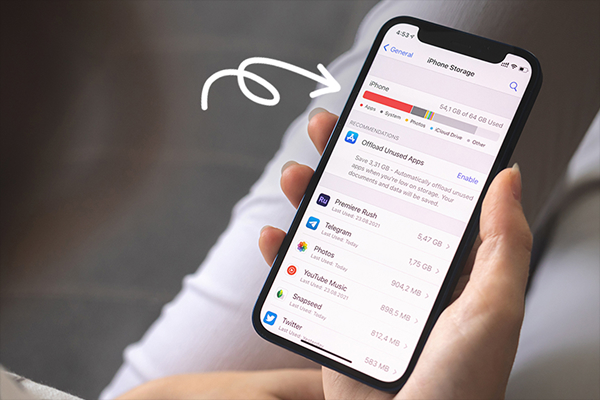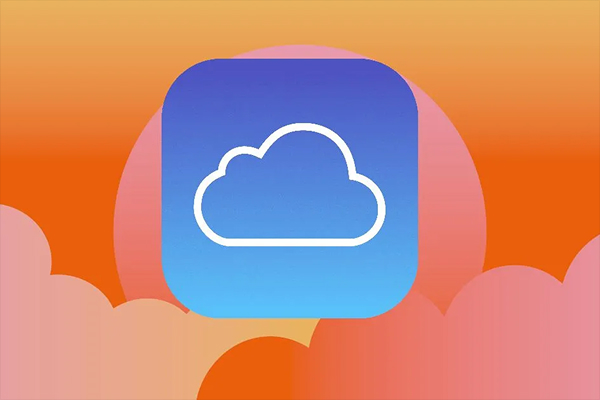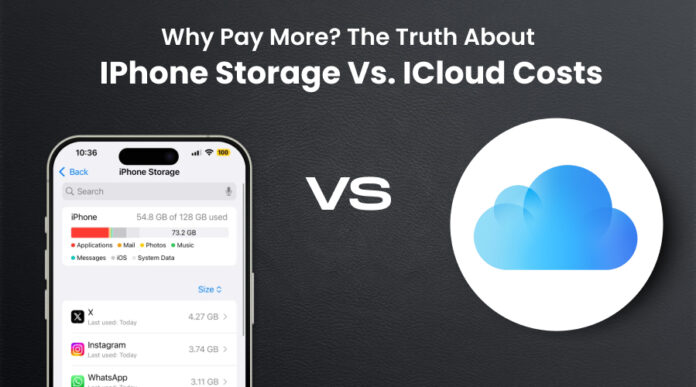Have you ever been annoyed by that irritating “Storage Almost Full” prompt on your iPhone? If yes, then you are not alone. Apple customers are usually left with a decision of whether to purchase an iPhone with higher storage space or sign up for iCloud. However, it is challenging to decide which of them is worth your money in the long term.
Apple offers you two primary storage options: storing data in the phone and the cloud storage with iCloud. Although they both have advantages, there is much confusion in relation to the price, limited storage, and convenience of usage. This blog provides all the essential details you need to know to ensure that you make rational storage decisions instead of continuing to pay too much.
Understanding iPhone Storage
iPhone storage is the built-in memory of your Apple device. It saves the applications, pictures, videos, and any other downloads and files on your phone directly.

In most cases, Apple would provide models with various large storage capacities, such as 128GB, 256GB, 512GB, and 1TB.
How iPhone Storage Works?
When you purchase an iPhone with a given storage, that is what you will get, as it can never be extended. The bigger storage models cost more money, and when they become full, there are two options you can avail: delete files or go to cloud storage.
Cost Breakdown
Here’s a look at the price jump for iPhones with more storage:
iPhone 15 (128GB) – $962
iPhone 15 (256GB) – $1,083
iPhone 15 (512GB) – $1,324
These figures reflect a $120–$360 jump just for extra internal space.
What is iCloud?
iCloud is an Apple-based cloud storage facility that allows the user to store photos, videos, documents, and backup files that are not on the device, but on cloud storage, where they can be accessed securely.

It is easy to access files in any location as it syncs data among all Apple gadgets. iCloud allows you to back up automatically and select storage plans to release some space on your phone without losing your data.
How iCloud Works?
As soon as you turn on iCloud, all your data begins to synchronize between devices. Your files will be available on any Apple device or the iCloud site. It also manages your iPhone by archiving the old records and making them accessible when needed.
iCloud Storage Plans & Global Pricing (Monthly)
- 5GB – Free (default for all Apple ID users)
- 50GB – $0.99/month
- 200GB – $2.99/month
- 2TB – $9.99/month
iPhone Storage vs. iCloud: The Real Difference
| Feature | iPhone Storage | iCloud Storage |
|---|---|---|
| Location | On-device | Cloud online |
| Expandable | No | Yes (monthly payment) |
| Price Flexibility | One-time, high | Monthly, affordable |
| Accessibility | iPhone only | Across Apple devices |
| Data Safety | Prone to loss | Encrypted & backed up |
| Usage Type | Apps, OS, media | Backups, photos, videos |
Pros and Cons of Buying Higher iPhone Storage
Advantages:
1. Works Seamlessly Without Internet
Internal storage lets you access all your files, videos, and apps without using Wi-Fi or your mobile data. This comes in handy, particularly when one is on the move or in a location with poor internet connectivity.
2. Better Performance for Large Apps
The iPhones with high storage handle big apps such as the video editor, 3D games and creativity tools with higher efficiency. There is better space for breathing, so they do not run into the problem of slowdowns or breakdowns because of storage capacity.
3. No Monthly Subscription
After buying a high-storage iPhone model, you do not incur monthly expenses. It is a one-time purchase, and you own the space, so it is not an expense but an investment.
4. Great for Professionals and Content Creators
Internal storage is stable when you take 4K videos, RAW photos, or deal with project files that take up a huge amount of space. It offers fast service and does not require the use of cloud sync speed.
Disadvantages:
1. Expensive Upfront Cost
A higher storage iPhone may cost 100-400 dollars more. As an example, upgrading your 128GB to 512GB will cost you a couple of hundred dollars more, even though you won’t utilize the additional room.
2. No Flexibility or Scalability
After buying an iPhone, you are not able to add additional storage. In case of the need in the future, resorting to file deletion or using external/cloud storage is the only option you have.
3. No Built-in Backup or Data Sync
An increased storage does not imply increased safety. Provided you have not subscribed to an additional backup service such as iCloud, there is a danger of losing your data if your phone is lost, stolen, or damaged.
4. Cost Doesn’t Transfer to Future Devices
When you move to a new iPhone, you are forced to pay more to get bigger storage. The money invested in additional storage is non-portable and does not provide any long-term value to any other device.
Pros and Cons of Using iCloud
Advantages:
1. Affordable and Scalable Storage: iCloud has flexible monthly plans beginning as low as $0.99 per month. The upgrade or downgrade of your storage package can be done at any point in time based on how much storage you need, and this offers a more affordable alternative as compared to purchasing greater iPhone storage capacity upfront.
2. Automatic Backups and Syncing: iCloud has the power to automatically back up your iPhone each day when connected to Wi-Fi or charging. This covers your photos, messages, app data, and settings so that all your data remains safe even in the case of you losing your phone.
3. Access Across All Apple Devices: Using iCloud means that you can access your files, notes, photos, and documents on your iPhone, iPad, Mac, and through the Web interface of iCloud.com. It provides a smooth transition between devices, which is just perfect when you are in the Apple ecosystem.
4. Frees Up iPhone Storage: iCloud assists in the storage of videos and backups, full resolution of photos, and frees up your local iPhone storage. You are also able to save the lightweight ones onto your device with the originals stored safely online.
5. Safe and Secure Storage: To encrypt your data, iCloud has end-to-end encryption and two-factor authentication. It is also possible to activate Advanced Data Protection to provide additional security. In case you misplace your device, you can still get access to your records through the cloud in a secure manner.
6. Family Sharing Option: The family sharing plan allows sharing the 200 GB iCloud storage with up to 5 family members and the 2TB iCloud storage with 5 family members. This will also make it a cost-effective type of storage, which will find common use in households with separate private storage for each member.
Disadvantages:
- Needs internet to view full-resolution files
- The cost of a monthly subscription accumulates over the years
- Limited compatibility with other non-Apple hardware
- Free 5GB gets filled up very fast
- Exposure of data if privacy settings are not adjusted accordingly
- May slow down sync if the internet connection is weak
What to Choose? Higher iPhone Storage or iCloud
It all depends on your usage and budget; you can either go for a higher iPhone storage or use iCloud. A higher storage iPhone might be more suitable if you constantly work offline, use heavy applications, and shoot a lot of 4K videos, but it costs you more up front. iCloud, on the other hand, provides easy, low-cost monthly pricing plans and enables you to synchronize, backup, and locate information across all Apple devices. For those evaluating options, tools like mobile Compare can be useful for analyzing the value between cloud storage and built-in capacity across various use cases.
A base model iPhone with 200 GB or 2 TB of iCloud storage is a healthier choice in terms of value, long-run convenience, and data security for the majority of users. iCloud is more intelligent than local backup because it offers flexibility, cloud backup, and cost reduction. However, for power users who need everything offline, higher local storage might still be a valuable option.
Conclusion
In conclusion, knowing the difference between iPhone storage and iCloud can help you make more intelligent financial and tech decisions. A high storage iPhone is convenient when one is not connected to the internet, but it is costly and non-upgradable. iCloud presents more affordable and elastic storage, with the benefit of data backup and cross-platform access.
To the majority of users, a combination of a basic iPhone storage plan with an iCloud plan would bring the most value. Rather than paying more at once, you can use iCloud to organize your files and work on them with ease and security. In today’s connected world, cloud storage is frequently more realistic and less expensive.

